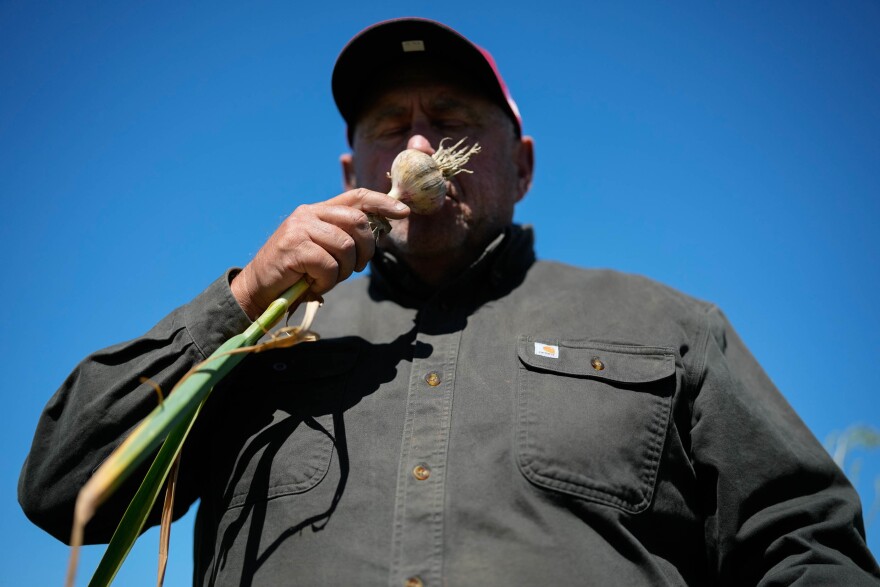Thayne Tagge stood on the hillside below Willard Peak, eating an apricot he had just plucked from one of his own trees. Below him, the valley stretched out in neat rows of peaches, corn, tomatoes, and berries across 130 acres of fruit and farmland.
Behind him, Willard Bay shimmered while Promontory Point and the Bear River Migratory Bird Refuge framed the horizon.
“They call this the ‘million-dollar view,’” said Tagge, owner of Tagge’s Famous Fruit and Veggie Farms, “but we’re not going to let that happen. Everybody wants to build here. Usually the best place to grow fruit is the best place to plant a home, too. We’re stopping that.”

Tagge has placed his 130-acre farm into a legacy trust, a mechanism designed to keep the land in agricultural use and prevent its sale or development. The trust ensures that the farmland will remain dedicated to fruit and vegetable production for future generations.
This step protects the farm’s role in supplying some of Utah’s only local produce, Tagge said, while preserving the $30 million property and maintaining its agricultural heritage.
“It can never be sold,” he said. “We love it too much.”
A mission to keep farming going

Utah currently produces only 3% of its fruit and 2% of its vegetable needs, relying heavily on imports to meet demand. In recent years, with the cost of farmland reaching new heights, Tagge said many growers have been selling out.
“So, we’re on a mission,” Tagge said, “number one to keep farming going. We support any local farmer, and we want him to survive, and we want him to succeed as well.”
Since purchasing their first orchard in 1997, Tagge and his wife, Cari, have steadily expanded their farm. Despite starting with little farming experience, the couple has grown their operation into one of the state’s most recognized producers.

Tagge has worked with other nearby farmers to keep more orchards in use and out of the hands of developers. Last year, two growers in the area chose to partner with him to keep their orchards in the business.
He said he sees these partnerships as a way to encourage long-term preservation over short-term payouts. For those not interested in continuing to farm, the land trust can lease the orchard to another grower, keeping the property productive.
Today, Tagge’s Famous Fruit and Veggie Farms is known not only along the stretch of U.S. 89 known as Utah’s “Fruit Way,” but also in markets and stands in Salt Lake City, Syracuse, Ogden, Cottonwood Heights, Holladay, Kamas, Midway, and Park City. The farm grows a variety of produce including peaches, corn, tomatoes, berries, and much more.

Tagge credits the farm’s success to a strong connection with Utah consumers through programs like its farm box, which ensures customers across the state receive fresh, locally grown produce directly from the farm every week.
“It’s a tremendous amount of effort,” he said, “but the payoff is very satisfying, and it works. And we’re setting this up so that it can sustain itself.”
Perfect land for peaches

Tagge’s orchards sit on a west-facing hillside above Willard Bay, a location he said creates ideal conditions for fruit. The rocky soil absorbs heat during the day, he said, while air currents from nearby mountains help stir and warm the trees overnight.
That combination, along with the cool, dry air off the nearby Great Salt Lake, gives the area a crucial two-degree buffer that often helps avoid late spring freezes — a difference that can mean the survival or loss of an entire peach crop, Tagge said. The geography also helps the orchards dodge hailstorms and damaging winds common just a mile or two away.

Water is another key advantage. The farm draws from Pineview Reservoir, with early water rights and a gravity-fed irrigation system that doesn’t rely on pumps. This is important in an area where drought can devastate a crop within a season or two, Tagge said.

These environmental factors, combined with Utah’s ultra-dry summers, allow the farm to control irrigation and limit mildew and diseases on fruit, he added. Tagge believes this microclimate is what allows his peaches, tomatoes, and berries to consistently stand out.
“When you look at real estate, you go, ‘What’s the highest misuse?’” Tagge said. “You can’t grow peaches everywhere. You can’t grow apricots everywhere. You can’t grow cherries. That’s the problem.”
Fruit for generations

Tagge’s son, Chad Tagge, had built a career in biomedical engineering when he decided to leave it behind and return to his family’s farm. He had earned a doctorate, worked in medical manufacturing and planned for a future in science.
But as he watched farmland around the family orchard disappear to development, he realized he could no longer sit back and watch.
“As I was sitting in my desk, I thought I just don’t want these trees to get torn out into homes,” Chad said. “Nobody’s tearing down a home to build an orchard.”

So, he quit his job to join the family business full time, learning the ins and outs of farming from his father and committing to take over the farm’s trust. Now, his days are spent in the sun — managing crops, helping customers at the farm stands, and preparing to lead the next generation of Tagge’s Fruit.
For him, keeping the farm alive means protecting not only the land but also the tradition and future of Utah farming. It’s about allowing future generations to enjoy homegrown fruit and vegetables, he said, and the deliciously unique experience that only local, fresh produce can provide.
“You literally could smell the peaches when there’s a light breeze,” Chad said. “When you go to the grocery store, you’re not going to be able to get those aromas. And I’m telling you, it is better. Being able to keep this in that legacy trust means that we will be able to grow peaches and have fruit for our state for the next generation.”



